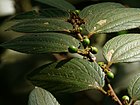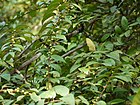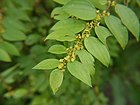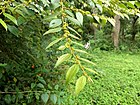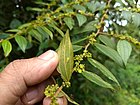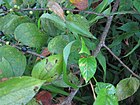Note: This is a project under development. The articles on this wiki are just being initiated and broadly incomplete. You can Help creating new pages.
Difference between revisions of "Ziziphus oenopolia"
(→References) |
|||
| (2 intermediate revisions by the same user not shown) | |||
| Line 3: | Line 3: | ||
==Uses== | ==Uses== | ||
{{Uses|Cuts}}, {{Uses|Wounds}}, {{Uses|Indigestion}}, {{Uses|Stomachache}}.<ref name="Uses"/> | {{Uses|Cuts}}, {{Uses|Wounds}}, {{Uses|Indigestion}}, {{Uses|Stomachache}}.<ref name="Uses"/> | ||
| + | |||
| + | ===Food=== | ||
| + | Ziziphus oenopolia can be used in Food. Ripe fruits are eaten raw.<ref name="Forest foods of Western Ghat"/> | ||
==Parts Used== | ==Parts Used== | ||
| Line 27: | Line 30: | ||
===Prabhava=== | ===Prabhava=== | ||
| + | |||
| + | ===Nutritional components=== | ||
| + | Ziziphus oenopolia Contains the Following nutritional components like - Vitamin-A, B and C; Calcium, Iron, Magnesium, Phosphorus, Potassium, Sodium<ref name="Forest foods of Western Ghat"/> | ||
==Habit== | ==Habit== | ||
| Line 36: | Line 42: | ||
===Flower=== | ===Flower=== | ||
| − | {{Flower|Tiny|Borne in nearly stalkless|Green|Velvety cymes in leaf axils}} | + | {{Flower|Tiny|Borne in nearly stalkless|Green|Velvety cymes in leaf axils|Flowering season is July-November}} |
===Fruit=== | ===Fruit=== | ||
| − | {{Fruit|Spherical|Obovoid drupes||||Balck, Shining}} | + | {{Fruit|Spherical|Obovoid drupes||||Balck, Shining, Fruiting season is July-November}} |
===Other features=== | ===Other features=== | ||
| Line 51: | Line 57: | ||
==How to plant/cultivate== | ==How to plant/cultivate== | ||
| − | <ref name="How to plant/cultivate"/> | + | Ziziphus oenopolia is available through October to February<ref name="How to plant/cultivate"/> |
==Commonly seen growing in areas== | ==Commonly seen growing in areas== | ||
| Line 59: | Line 65: | ||
<gallery class="left" caption="" widths="140px" heights="140px"> | <gallery class="left" caption="" widths="140px" heights="140px"> | ||
Aule Bayar (Nepalese- औले बयर्) (2991444173).jpg | Aule Bayar (Nepalese- औले बयर्) (2991444173).jpg | ||
| − | |||
| − | |||
Burgi (Konkani- बुर्गी) (4102831216).jpg | Burgi (Konkani- बुर्गी) (4102831216).jpg | ||
| − | |||
| − | |||
Burgi (Marathi- बुर्गी) (3969152169).jpg | Burgi (Marathi- बुर्गी) (3969152169).jpg | ||
| − | |||
| − | |||
Discolompa ethion,Banded blue pierrot, നീലവരയൻ ചെൻകോമാളി .jpg | Discolompa ethion,Banded blue pierrot, നീലവരയൻ ചെൻകോമാളി .jpg | ||
| − | |||
| − | |||
Discolompa ethion,Banded blue pierrot, നീലവരയൻ ചെൻകോമാളി 2.jpg | Discolompa ethion,Banded blue pierrot, നീലവരയൻ ചെൻകോമാളി 2.jpg | ||
| − | |||
| − | |||
Jackal Jujube - മുള്ളൻപ്പഴം 01.JPG | Jackal Jujube - മുള്ളൻപ്പഴം 01.JPG | ||
| − | |||
| − | |||
Jackal Jujube - മുള്ളൻപ്പഴം 02.JPG | Jackal Jujube - മുള്ളൻപ്പഴം 02.JPG | ||
| − | |||
| − | |||
Jackal Jujube - മുള്ളൻപ്പഴം 03.JPG | Jackal Jujube - മുള്ളൻപ്പഴം 03.JPG | ||
| − | |||
| − | |||
Jackal Jujube - മുള്ളൻപ്പഴം 04.JPG | Jackal Jujube - മുള്ളൻപ്പഴം 04.JPG | ||
| − | |||
</gallery> | </gallery> | ||
| Line 96: | Line 85: | ||
<ref name="How to plant/cultivate">[http://tropical.theferns.info/viewtropical.php?id=Ziziphus+oenopolia Cultivation]</ref> | <ref name="How to plant/cultivate">[http://tropical.theferns.info/viewtropical.php?id=Ziziphus+oenopolia Cultivation]</ref> | ||
<ref name="Uses">Indian Medicinal Plants by C.P.Khare</ref> | <ref name="Uses">Indian Medicinal Plants by C.P.Khare</ref> | ||
| + | <ref name="Forest foods of Western Ghat">"Forest food for Northern region of Western Ghats" by Dr. Mandar N. Datar and Dr. Anuradha S. Upadhye, Page No.154, Published by Maharashtra Association for the Cultivation of Science (MACS) Agharkar Research Institute, Gopal Ganesh Agarkar Road, Pune</ref> | ||
</references> | </references> | ||
Latest revision as of 17:11, 17 November 2021
Ziziphus oenopolia is a thorny, evergreen shrub with straggling branches, often scrambling into other vegetation; it can grow around 5 metres tall. The plant is harvested from the wild for local use as a food, medicine and source of materials. The fruits are sometims sold in local markets. The plant is sometimes grown as a hedge.
Contents
- 1 Uses
- 2 Parts Used
- 3 Chemical Composition
- 4 Common names
- 5 Properties
- 6 Habit
- 7 Identification
- 8 List of Ayurvedic medicine in which the herb is used
- 9 Where to get the saplings
- 10 Mode of Propagation
- 11 How to plant/cultivate
- 12 Commonly seen growing in areas
- 13 Photo Gallery
- 14 References
- 15 External Links
Uses
Cuts, Wounds, Indigestion, Stomachache.[1]
Food
Ziziphus oenopolia can be used in Food. Ripe fruits are eaten raw.[2]
Parts Used
Chemical Composition
It contains betulin, betulinic aldehyde, betulinic acid, alphitolic acid, euscaphic acid, zizyberenalic acid, and β−sitosterol, one coumarin, scopoletin and four flavonoids, kaempferol, afzelin, quercitrin etc.[3]
Common names
| Language | Common name |
|---|---|
| Kannada | Pargi, Barige |
| Hindi | Makkay, Makai |
| Malayalam | Tutali |
| Tamil | Suraimullu |
| Telugu | Paraki |
| Marathi | Burgi |
| Gujarathi | |
| Punjabi | |
| Kashmiri | |
| Sanskrit | Karkandhauh |
| English | Jackal Jujube, Small-Fruited Jujube |
Properties
Reference: Dravya - Substance, Rasa - Taste, Guna - Qualities, Veerya - Potency, Vipaka - Post-digesion effect, Karma - Pharmacological activity, Prabhava - Therepeutics.
Dravya
Rasa
Guna
Veerya
Vipaka
Karma
Prabhava
Nutritional components
Ziziphus oenopolia Contains the Following nutritional components like - Vitamin-A, B and C; Calcium, Iron, Magnesium, Phosphorus, Potassium, Sodium[2]
Habit
Identification
Leaf
| Kind | Shape | Feature |
|---|---|---|
| Ovate-Lnceolate | Base-Oblique | Underside clothed with rusty tomentum |
Flower
| Type | Size | Color and composition | Stamen | More information |
|---|---|---|---|---|
| Tiny | Borne in nearly stalkless | Green | Velvety cymes in leaf axils | Flowering season is July-November |
Fruit
| Type | Size | Mass | Appearance | Seeds | More information |
|---|---|---|---|---|---|
| Spherical | Obovoid drupes | Balck, Shining, Fruiting season is July-November |
Other features
List of Ayurvedic medicine in which the herb is used
Where to get the saplings
Mode of Propagation
How to plant/cultivate
Ziziphus oenopolia is available through October to February[6]
Commonly seen growing in areas
Margins of subtropical forests, Thickets.
Photo Gallery
References
- ↑ Indian Medicinal Plants by C.P.Khare
- ↑ 2.0 2.1 "Forest food for Northern region of Western Ghats" by Dr. Mandar N. Datar and Dr. Anuradha S. Upadhye, Page No.154, Published by Maharashtra Association for the Cultivation of Science (MACS) Agharkar Research Institute, Gopal Ganesh Agarkar Road, Pune
- ↑ Chemical constituents
- ↑ Common names
- ↑ Kappatagudda - A Repertoire of Medicianal Plants of Gadag by Yashpal Kshirasagar and Sonal Vrishni, Page No. 400
- ↑ Cultivation
External Links
- Ayurvedic Herbs known to be helpful to treat Cuts
- Ayurvedic Herbs known to be helpful to treat Wounds
- Ayurvedic Herbs known to be helpful to treat Indigestion
- Ayurvedic Herbs known to be helpful to treat Stomachache
- Herbs with Root used in medicine
- Herbs with Bark used in medicine
- Herbs with Fruits used in medicine
- Herbs with common name in Kannada
- Herbs with common name in Hindi
- Herbs with common name in Malayalam
- Herbs with common name in Tamil
- Herbs with common name in Telugu
- Herbs with common name in Marathi
- Herbs with common name in Sanskrit
- Herbs with common name in English
- Habit - Evergreen shrub
- Index of Plants which can be propagated by Seeds
- Index of Plants which can be propagated by Root suckers
- Herbs that are commonly seen in the region of Margins of subtropical forests
- Herbs that are commonly seen in the region of Thickets
- Herbs

